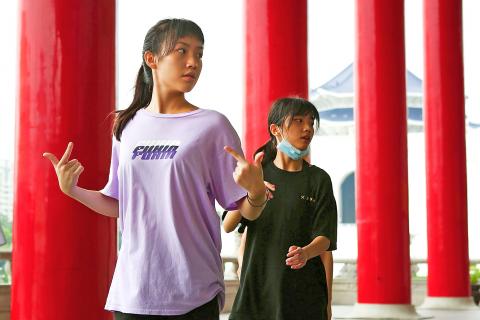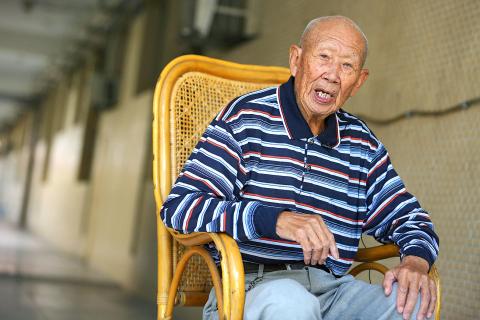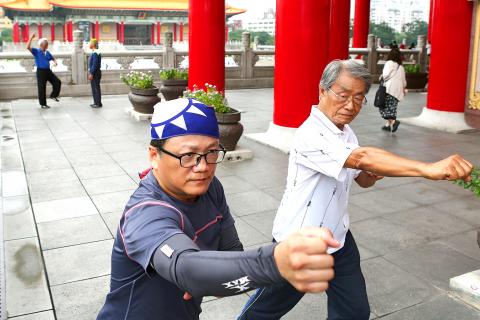Communist China’s creation seven decades ago irrevocably changed Taiwan, but Beijing’s huge celebrations this week are to be met with a collective shrug in a nation where people increasingly see themselves as distinct from China.
After the People’s Republic of China (PRC) was declared on Oct. 1, 1949, its rival, the Republic of China (ROC), set up in Taiwan — where Chiang Kai-shek’s (蔣介石) defeated Chinese Nationalist Party (KMT) fled to and imposed their will.
Taiwan remains a sore point to this day among Chinese Communist Party (CCP) leaders in Beijing — viewed as a missing piece of a geographical puzzle that must one day be completed.

Photo: Hsu Tsun-hsu / AFP
However, for younger Taiwanese such as Doris Cheng, the idea that her homeland is a part of China is anathema.
“Taiwan is a country,” said the 16-year-old, while taking a break from practicing hip-hop dance moves with friends in Taipei’s Liberty Square. “Taiwan has autonomy, a government, our own people and territory.”
Fellow dancer Stephanie Fu, an 18-year-old college student, agreed.

Photo: Hsu Tsun-hsu / AFP
“I think it is natural that we see ourselves as Taiwanese, we were not born in China after all,” she said.
“There’s no sense of belonging to China,” she said. “Culturally we may be Chinese and similar, but there are still differences.”
The CCP has never controlled Taiwan and historically Chinese governments have exerted nominal control for only a fraction of the island’s history.

Photo:Hsu Tsun-hsu / AFP
However, Chinese President Xi Jinping (習近平) has made no secret of his desire to see Taiwan brought into China’s fold.
In a speech on Jan. 2, he described Taiwan’s absorption as “inevitable” and said the “problem” must not be put off for the next generation to handle.
Yet that increasingly assertive rhetoric from Beijing has done little to win over Taiwanese, who have now experienced more than two decades of democracy.
According to a regular poll by National Chengchi University, those who identify as solely Taiwanese has rocketed from 18 percent in 1992 to 55 percent last year.
Those who see themselves as “Taiwanese and Chinese” has hovered around 40 percent, while those who identify as Chinese only has plummeted from one-quarter of the population to 4 percent, the poll found.
The emergence of a growing Taiwanese identity is a headache for Beijing’s plans, but many older Taiwanese still see themselves as part of a wider Chinese family.
On the other side of Liberty Square, 56-year-old David Chang was teaching a martial arts class, a ROC flag bandana on his head.
“We have been taught where we came from, where our blood flowed. Your nationality can change, but our blood flows from China,” Chang said.
However, being Chinese does not mean belonging to Beijing, he said.
“To my generation, the concept of country is stronger. We see the ROC as our country. This was how I was taught,” Chang added.
Hsiang Pi-chien, 100, is one of a dwindling number of people who remember the birth of the PRC.
At his retirement home for Nationalist Army veterans in Tainan he recalled how he and his fellow soldiers had spent weeks retreating from Mao Zedong’s (毛澤東) communist forces.
It was 39 years before he returned to his village home when relations between the two sides finally began to thaw. Almost all of his family were dead.
“Back then China was so poor,” he said. “Compared to Taiwan it was like heaven and earth, there’s no comparison.”
Taiwan had undergone an economic miracle and was emerging from decades of repressive martial law, moving toward the vibrant democracy it would become.
China has since transformed itself into the world’s second-largest economy and a military power, with the one-party state as repressive and more in control than ever.
It is a remarkable transition Beijing will place front and center at this week’s celebrations.
Taiwan heads to the polls on Jan. 11 and the relationship with China will dominate campaigning, but whoever wins, it is clear that CCP leaders will have an increasingly tough time persuading skeptical younger generations of Taiwanese — especially as Beijing takes a hard line to pro-democracy protests in Hong Kong.
“I feel it is the freedom of speech,” said Fu, when asked to describe what separates the two neighbors. “Unlike us, they are unable to express themselves freely with some things, especially when it comes to politics.”
With that, she returned to her dance class.

A preclearance service to facilitate entry for people traveling to select airports in Japan would be available from Thursday next week to Feb. 25 at Taiwan Taoyuan International Airport, Taoyuan International Airport Corp (TIAC) said on Tuesday. The service was first made available to Taiwanese travelers throughout the winter vacation of 2024 and during the Lunar New Year holiday. In addition to flights to the Japanese cities of Hakodate, Asahikawa, Akita, Sendai, Niigata, Okayama, Takamatsu, Kumamoto and Kagoshima, the service would be available to travelers to Kobe and Oita. The service can be accessed by passengers of 15 flight routes operated by

Chinese spouse and influencer Guan Guan’s (關關) residency permit has been revoked for repeatedly posting pro-China videos that threaten national security, the National Immigration Agency confirmed today. Guan Guan has said many controversial statements in her videos posted to Douyin (抖音), including “the red flag will soon be painted all over Taiwan” and “Taiwan is an inseparable part of China,” and expressing hope for expedited reunification. The agency last year received multiple reports alleging that Guan Guan had advocated for armed reunification. After verifying the reports, the agency last month issued a notice requiring her to appear and explain her actions. Guan

GIVE AND TAKE: Blood demand continues to rise each year, while fewer young donors are available due to the nation’s falling birthrate, a doctor said Blood donors can redeem points earned from donations to obtain limited edition Formosan black bear travel mugs, the Kaohsiung Blood Center said yesterday, as it announced a goal of stocking 20,000 units of blood prior to the Lunar New Year. The last month of the lunar year is National Blood Donation Month, when local centers seek to stockpile blood for use during the Lunar New Year holiday. The blood demand in southern Taiwan — including Tainan and Kaohsiung, as well as Chiayi, Pingtung, Penghu and Taitung counties — is about 2,000 units per day, the center said. The donation campaign aims to boost

The Central Weather Administration (CWA) said a magnitude 4.9 earthquake that struck off the coast of eastern Taiwan yesterday was an independent event and part of a stress-adjustment process. The earthquake occurred at 4:47pm, with its epicenter at sea about 45.4km south of Yilan County Hall at a depth of 5.9km, the CWA said. The quake's intensity, which gauges the actual effects of a temblor, was highest in several townships in Yilan and neighboring Hualien County, where it measured 4 on Taiwan's seven-tier intensity scale, the CWA said. Lin Po-yu (林柏佑), a division chief at the CWA's Seismological Center, told a news conference